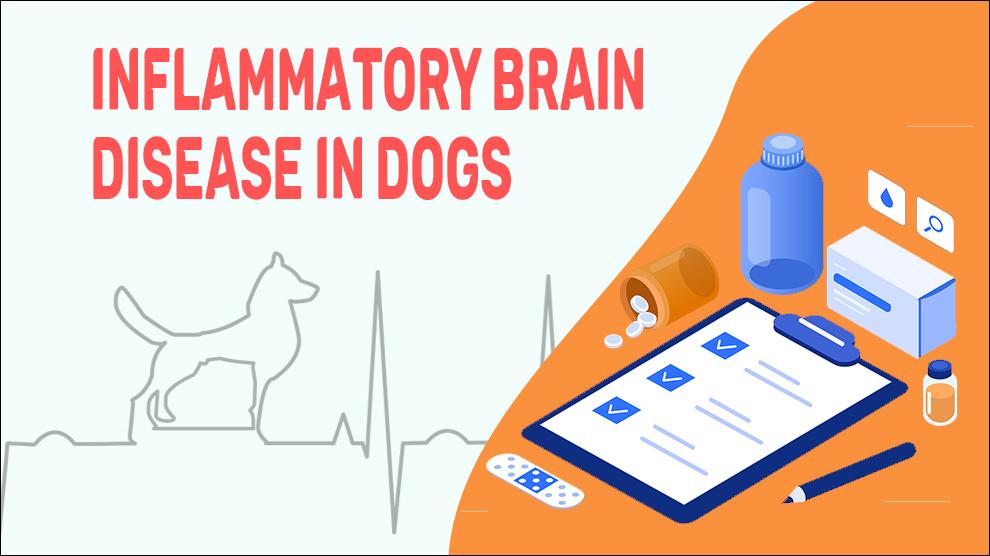What Is Inflammatory Brain Disease In Dogs?
Inflammatory brain disease (IBD) is an acute, inflammatory, progressive disease that affects the brain and central nervous system of dogs.
Inflammatory brain disease causes the inflammation of the brain with the focal buildup of inflammatory cell infiltrate. Meningitis refers to an acute inflammation of the fluid and outer membranes of connective tissue surrounding the spinal cord and brain. Encephalitis is inflammation of brain parenchyma (the active tissues of the brain) caused by an autoimmune response or a viral infection.
Meningoencephalitis is a very rare neurological condition that resembles meningitis and encephalitis or both can happen simultaneously. However, meningoencephalitis and Meningitis are treated as two separate conditions. There are several causes of Meningoencephalitis, that include both infectious and non-infectious factors such as immune-mediated disorders, paraneoplastic syndromes, malignancy, and adverse drug reactions.
Brain inflammation pathogenesis is poorly understood and it tends to be more prevalent in small and medium-sized breeds; however, any breed can be affected. This condition also affects the central nervous system (CNS) which consecutively affects all the significant parts of the body. When your dog starts showing obvious symptoms, such as (confusion, convulsions, fever, etc) it may have already caused irreversible damage. However, if the cause of the brain inflammation is curable, with proper treatment your dog has a chance of recovery.
Symptoms Of Inflammatory Brain Disease In Dogs
Initial stage:
- Muscle spasms in the forelegs, back, or neck
- A dog holding its back or neck or stiffness in the spine
- Head tilting/ Pacing or circling
- Unsteadiness or trouble while walking
- Sensitivity to touch
- Fever/depression/ Weakness
- Vomiting
- Low blood pressure
- Loss of appetite
Advanced stage:
- Confusion or disorientation
- Loss of muscle control/ Severe unsteadiness
- Seizures
- Paralysis
- Stupor or Dullness
- Blindness
- Abnormal levels of agitation/ aggression
Treatment Options For Inflammatory Brain Disease In Dogs
Your veterinary neurologist may prescribe medications depending on the cause (infectious or non-infectious cause)
- Immunosuppressive Steroids - Prednisone, prednisolone, cyclosporine, azathioprine, leflunomide, or mycophenolate mofetil.
- Antibiotics: Antifungals, Antivirals, and anti-parasitic medications
- Antiepileptic drugs: Phenobarbital and bromide, Levetiracetam, benzodiazepine (midazolam), clorazepate, gabapentin, felbamate and zonisamide.
- Intravenous fluids: For dehydrated dogs
- Pain medication: NSAIDs :
- Carprofen (Carprieve, Canidryl, Rimadyl, Aventicarp, Zinecarp, Carpox, Rimifin, Vetprofen)
- Firocoxib (Equioxx, Previcox)
- Meloxicam (Metacam, Muvera, Mobic)
- Etodolac (Lodine, EtoGesic)
- Deracoxib (Novartis, Deramaxx)
- Analgesics: Deracoxib, Firocoxib, Meloxicam, Grapiprant etc
Home Remedies For Inflammatory Brain Disease In Dogs
- Although anxiety medications may have side effects, the gains often greatly prevail over the risk.
- The brain inflammation treatment provided these days is to decrease the incidence and severity of the tremors.
- The dog can continue to lead a healthy life with regular follow-ups by your vet.
How To Prevent Inflammatory Brain Disease In Dogs?
- The bad news is brain inflammation can be caused by several factors, so there is no way to prevent it
- This condition is rare in dogs
- Adhere to healthy routines. Follow the procedure for preventing infections
- When you see any cuts or wounds, use medicated wipes that include a skin disinfectant to clean the skin of the dogs
- Regular screenings of blood, urine, and fecal samples are always good for dogs
Affected Dog Breeds Of Inflammatory Brain Disease
Bernese Mountain Dog, Beagle, Chihuahua, German Shorthaired Pointer, Dachshund, French Bulldog, Papillon, Pekingese, Irish Wolfhound, Maltese, Pug, Pembroke Welsh Corgi, Nova Scotia Duck Tolling Retriever, Yorkshire Terrier, West Highland White Terrier, Pomeranian, Young Dogs, Middle Age Dogs
Causes And Types For Inflammatory Brain Disease In Dogs
1. Causes:
Infectious inflammatory brain disease in dogs:
Blastomycosis (Blastomyces Dermatitidis - Yeastlike fungal infection)
Histoplasmosis (Histoplasma Capsulatum - Fungal infection)
Neosporosis (Parasitic Infection - Neospora Caninum)
Canine Distemper Virus (viral, contagious multisystemic viral disease)
Baylisascaris procyonis (parasitic- Roundworm of raccoons)
Toxoplasmosis (Parasitic Infection - Toxoplasma Gondii)
Cryptococcus (Invasive Fungal Infection)
Heartworms (Parasitic- Dirofilaria Immitis)
Non-infectious Inflammatory brain disease:
Immune-mediated meningitis.
2. Types:
1. Infectious IBD:
This is caused by viruses, fungi, bacteria, parasites, or protozoal infections
2. Non-Infectious IBD:
Beagle pain syndrome - Autoimmune disorder in beagles (Juvenile polyarteritis)
Aseptic meningitis – Meningeal inflammation with negative cerebrospinal fluid (CSF) bacterial cultures
Pug encephalitis- Necrotizing meningoencephalitis (NME). This is a destructive disease affecting pugs
3. Idiopathic and other IBD: Causes include chemical reactions, toxins, drug allergies, some types of cancer, and inflammatory diseases such as sarcoidosis.
3. Diagnosis:
- Blood tests
- Serum biochemistry profile, and urinalysis
- MRI and/or CT of the brain
- Cerebrospinal fluid (CSF) tap
4. Mortality:
Brain inflammation is a fatal condition and the case fatality rate is high that also leads to long-term complications.
5. Prognosis:
Brain inflammation prognosis depends upon the underlying cause. Non-infectious brain inflammation typically carries a good prognosis. Infectious and immune-mediated brain inflammation cases carry a guarded prognosis.
Causes And Types For Inflammatory Brain Disease In Dogs
It’s better to set up an appointment with your veterinarian if you notice-
- Confusion or disorientation
- Loss of muscle control/ Severe unsteadiness
- Seizures
- Paralysis
Food Suggestions For Inflammatory Brain Disease In Dogs
- Antioxidants: Blueberries, Strawberries, Raspberries, Cranberries, Red cabbage, cooked yellow squash, kale, Steamed broccoli, green beans, and spinach
- Complex Carbs: Chickpeas, Brown Rice, legumes, Oatmeal, Sweet Potatoes, Whole Grains, etc
- Oily Fish such as Sardines, Cod, anchovies, Salmon, tuna, Herring, Mackerel, and Lake trout, (omega-3 fatty acids)
- Green Leafy Veggies: Kale, Broccoli, spinach, cauliflower, cabbage, and swiss chard
- Fiber-filled veggies: Carrots, beets, Sweet potato, pumpkin, Turnip greens, etc
Conclusion
For dogs with Infectious and immune-mediated brain inflammation, the long-term prognosis regardless of treatment is generally poor. Usually, the dog’s ability to recuperate from brain inflammation will depend on the underlying cause, the period it is affected, and the overall health of the pet.

















